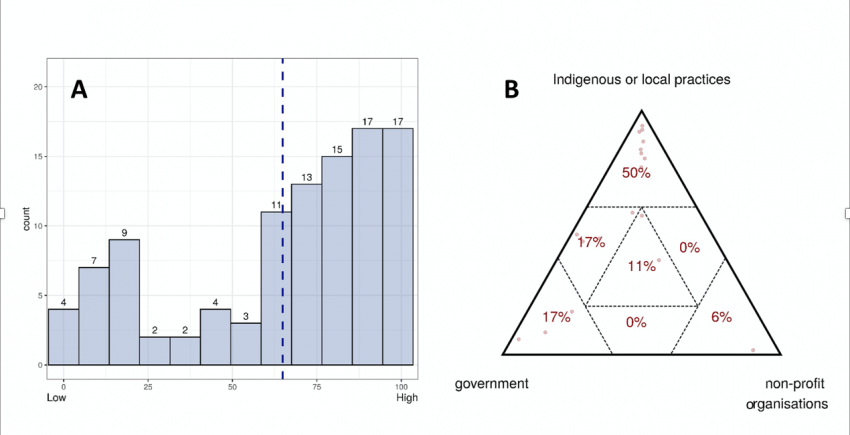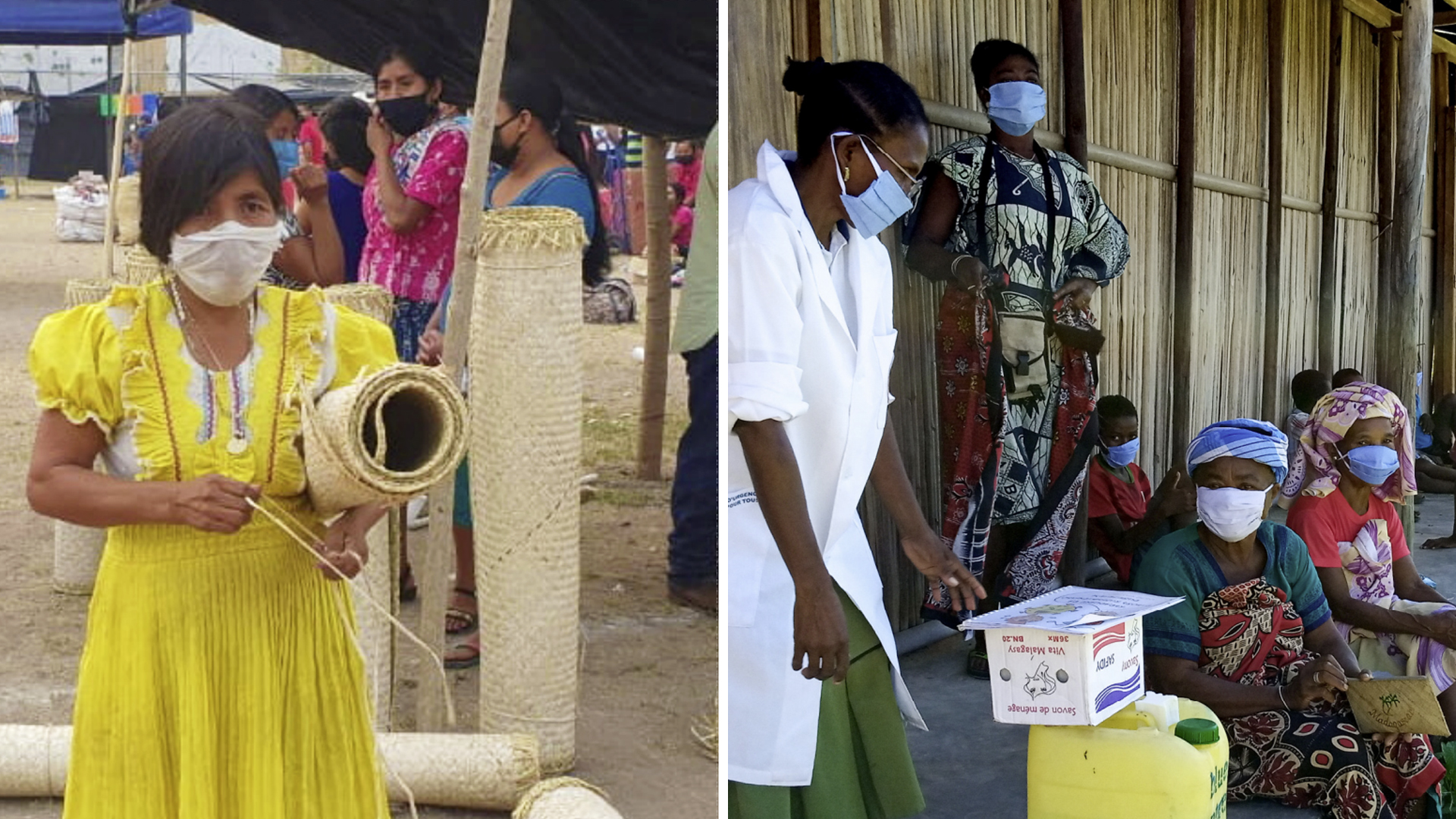First published on 03/26/2021, and last updated on 02/11/2025
A collaborative study by the University of Lausanne and the ICCA Consortium reveals how the COVID-19 pandemic is affecting Indigenous peoples and local communities
By Gretchen Walters (ICCA Consortium Honorary member), University Lausanne
Samir Laouadi, University Lausanne; and
Thomas Niederberger, Research and Publications Coordinator, ICCA Consortium
A version of this blog first appeared on CEESP News
A collaborative study (PDF file available here) by the University of Lausanne and the ICCA Consortium, involving 16 authors from 14 countries around the world, reveals how the COVID-19 pandemic is affecting Indigenous peoples and local communities, especially those who govern, manage, and conserve their lands and waters. The situation generates both negative impacts and adaptive and resilient responses from Indigenous peoples and local communities. The study is published in PARKS: The International Journal of Protected Areas and Conservation.
COVID-19, Indigenous peoples, local communities and natural resource governance
We studied access and use of natural resources, solidarity, decision-making, the role of governments and IPLCs in managing COVID-19, and the uptake of traditional medicine.
These themes are explored through a preliminary analysis of a global online survey using a story-based method in English, Spanish, and French representing 133 respondents from 40 countries. The study presents in-depth case studies from Benin, Fiji, France, Gabon, Guyana, Guatemala, India, and Madagascar, highlighting challenges and opportunities in how Indigenous peoples and local communities respond to COVID-19.
The initial analysis of surveys and case studies shows that COVID-19 has impacted communities in different ways. Though it is impossible to generalize, early outcomes have emerged regarding Indigenous peoples’ and local communities’ responses, resilience, and rights in the context of COVID-19.

(A) Traditional medicine was often considered to be ‘highly used’. (B) Stories concerning traditional medicine in 50% of the answers, were associated with pride.
Indigenous peoples’ and local communities’ responses to COVID-19
- In many cases, the government was absent or unable to react quickly, and communities and their leaders stepped in. Leaders were able to act fast, despite a lack of medical facilities. Communities with better recognized rights could respond quickly, deciding to self-quarantine before governmental measures were enacted.
- Traditional medicine was often used to counteract some COVID-19 symptoms (see Figures A and B).
Resilience and rights
- Lockdowns negatively affected the ability of Indigenous peoples and local communities to defend their lands, especially if the private sector was not locked down and able to disrespect community rights.
- Indigenous peoples and local communities that can govern and access their lands and waters appeared to be more resilient. Through access, they were able to secure food and medicine for themselves and outsiders and returning emigrants in need.
- Market access, strongly promoted by proponents of economic growth, has both strengths and weaknesses in a situation like this. Communities that relied heavily on markets to buy and sell, or for employment, were generally less resilient.
- Communities living near protected and conserved areas who invested in wildlife tourism and rely on income from visitors are now struggling to meet needs that had been covered by tourist fees.
Results underscore the importance of self-empowerment and recognition of the rights of Indigenous peoples and local communities, which allows them to use traditional medicines, meet subsistence requirements during lockdowns, help community members and neighbors to sustain livelihoods, and govern, defend and conserve their territories.
These key actions may help to support Indigenous peoples and local communities to navigate future pandemics while protecting their lands and waters:
- A rights-based approach to crisis responses is needed, in which priority is given to tenure and rights as they pertain to communities governing their lands and territories.
- Governments and development workers should recognize and protect the rights of Indigenous peoples and communities to govern their lands and territories because that is where the resources (water, food, and medicine) needed to cope with pandemics are to be found.
- Companies must not use crises as reasons to stop engaging with Indigenous peoples and local communities or to move into their lands.
- Crisis response measures to COVID-19 should: be jointly conceived with Indigenous peoples and local communities; value diverse perspectives and approaches; and recognize the actions that many communities undertake independently.
- Governments and NGOs should learn from and disseminate COVID-19 success stories carried out by Indigenous peoples and communities.
- Greater diversity of funding is needed for conservation initiatives that engage with Indigenous peoples and local communities, with priority given to direct funding of ICCAs and their custodians.
- Long-term partnerships between protected and conserved areas and Indigenous peoples and communities are needed, which ensure that communities’ access to natural resources is not put at risk in times of crisis.
Further analysis will be made in 2021, in collaboration with the ICCA Consortium.
Reference
Gretchen Walters, Neema Pathak Broome, Marina Cracco, Tushar Dash, Nigel Dudley, Silvel Elías, Olivier Hymas, Sangeeta Mangubhai, Vik Mohan, Thomas Niederberger, Christy Achtone Nkollo Kema Kema, Appolinaire Oussou Lio, Njaka Raveloson, June Rubis, S.A.R. Mathieu Toviehou and Nathalie Van Vliet. 2021. COVID-19, Indigenous peoples, local communities and natural resource governance. PARKS 27 (Special Issue), ed. By Brent Mitchell and Adrian Phillips, pp. 57-72. DOI:10.2305/IUCN.CH.2021.PARKS-27-SIGW.en
Featured image: (Left) A Maya Ch’or; woman sells her product in a local market in
Guatemala © Teodoro González. COMUNDICH-Guatemala. (Right) A community health worker teaches handwashing, Madagascar
© Blue Ventures
